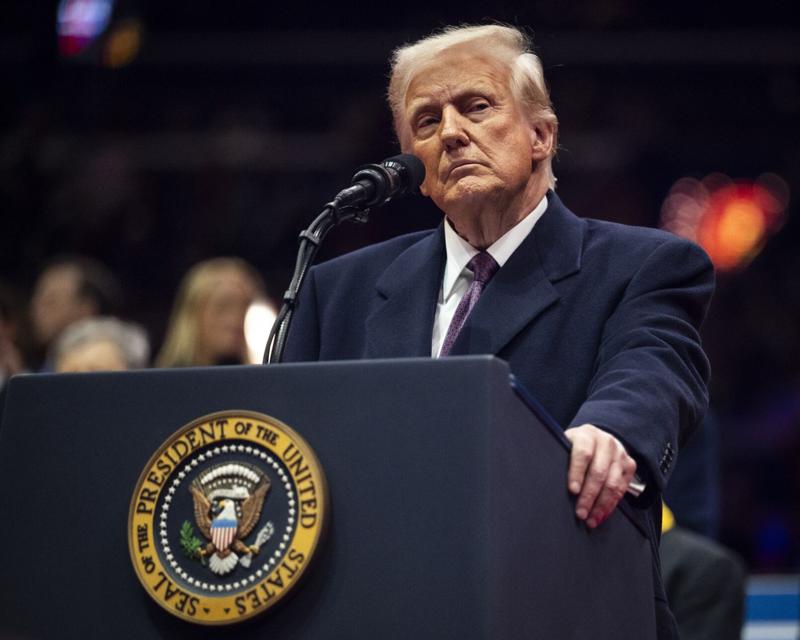China hit back Tuesday with limited tariffs on U.S. imports as the world’s two largest economic powers face off in a trade dispute.
U.S. President Donald Trump threw the first punch Monday with an additional 10% tariff on imports from China, the only one of his tariff promises that wasn’t immediately paused. China was ready with its response: The Customs Tariff Commission of the State Council of China levied additional tariffs on some U.S. imports while filing a complaint with the World Trade Organization.
The Embassy of the People’s Republic of China in the U.S. criticized Trump’s decision.
“The U.S. has levied a 10% additional tariff on Chinese imports under the pretext of the fentanyl issue,” the embassy said. “China firmly deplores and opposes this move.”
China said the fentanyl issue is a U.S. problem and that it addressed the matter in 2019. The embassy also noted the nation’s strict drug policies.
“China is one of the world’s toughest countries on counternarcotics both in terms of policy and its implementation. Fentanyl is an issue for the U.S. In the spirit of humanity and goodwill, China has given support to the U.S.’s response to this issue,” the embassy statement said. “At the U.S.’s request, China announced back in 2019 the decision to officially schedule fentanyl-related substances as a class. We are the first country in the world to do so. In recent years, China and the U.S. have carried out extensive, practical cooperation in the field of drug control, and made a lot of visual progress in the areas of substance control, information exchange, case cooperation, online advertisement cleanup, drug detection technology exchange, and multilateral interactions. The achievements we have made are there for all to see.”
China didn’t appear ready to bow to Trump’s demands.
“Reducing domestic drug demand and strengthening law enforcement cooperation are the fundamental solutions,” the embassy said. “The U.S. needs to view and solve its own fentanyl issue in an objective and rational way, cherish China’s goodwill, instead of threatening other countries with arbitrary tariff hikes.”
The Chinese embassy added that the trade war violates WTO rules and could undermine future cooperation between the two nations.
“The unilateral tariff increase by the U.S. seriously violates WTO rules and is a typical act of unilateralism and trade protectionism,” it said. “It undermines the foundation of China-U.S. economic and trade cooperation and is bound to affect and undermine future counternarcotics cooperation between the two sides.”
The embassy also called the U.S. “to correct its wrongdoings, maintain the hard-won positive dynamics in the counternarcotics cooperation, and promote the steady, sound and sustainable development of China-U.S. relationship.”
China also announced an investigation into U.S. search giant Google for alleged anti-trust violations and tightened export controls on tungsten and other rare earth elements.
Chinese markets were closed Tuesday for the Lunar New Year holiday.
China’s measures are set to go into effect on Feb. 10.
Trump said his tariffs on China were an “opening salvo” and promised more pain if the two countries couldn’t reach a deal.
“If we can’t make a deal with China, then the tariffs would be very, very substantial,” Trump said.
Trump said the U.S. trade deficit with China stands at more than $1 trillion.
“They’re using our money to build their military,” he said Tuesday afternoon in the Oval Office.
Trump also said he’s in no hurry to talk with President of the People’s Republic of China Xi Jinping.
“I’m in no rush,” Trump said.
Trump also described the pause on 25% tariffs for Mexico and Canada as a “short-term freeze.”
On Monday, Trump paused his plans for 25% tariffs on goods from Mexico and Canada over fentanyl smuggling.
On Saturday, Trump ended decades of duty-free trade between the U.S., Mexico, and Canada with a 25% tariff on imported goods from the two countries, with a lower 10% tariff on Canadian energy resources. Trump said he’d keep the tariffs in place until the illegal fentanyl trade subsided. He also added a 10% tariff on imports from China over that country’s role in producing the chemicals needed to make fentanyl, a powerful opioid blamed for the majority of U.S. overdose deaths.
Two days after hitting U.S. neighbors with tariffs, Trump relented after reaching temporary deals with both Mexico and Canada. Mexican President Claudia Sheinbaum said Mexico will immediately reinforce the border with 10,000 members of the National Guard in a move to stop drug trafficking, an issue that has been a problem for decades. Canadian Prime Minister Justin Trudeau also promised to reinforce the northern U.S. border in exchange for a pause on tariffs.







